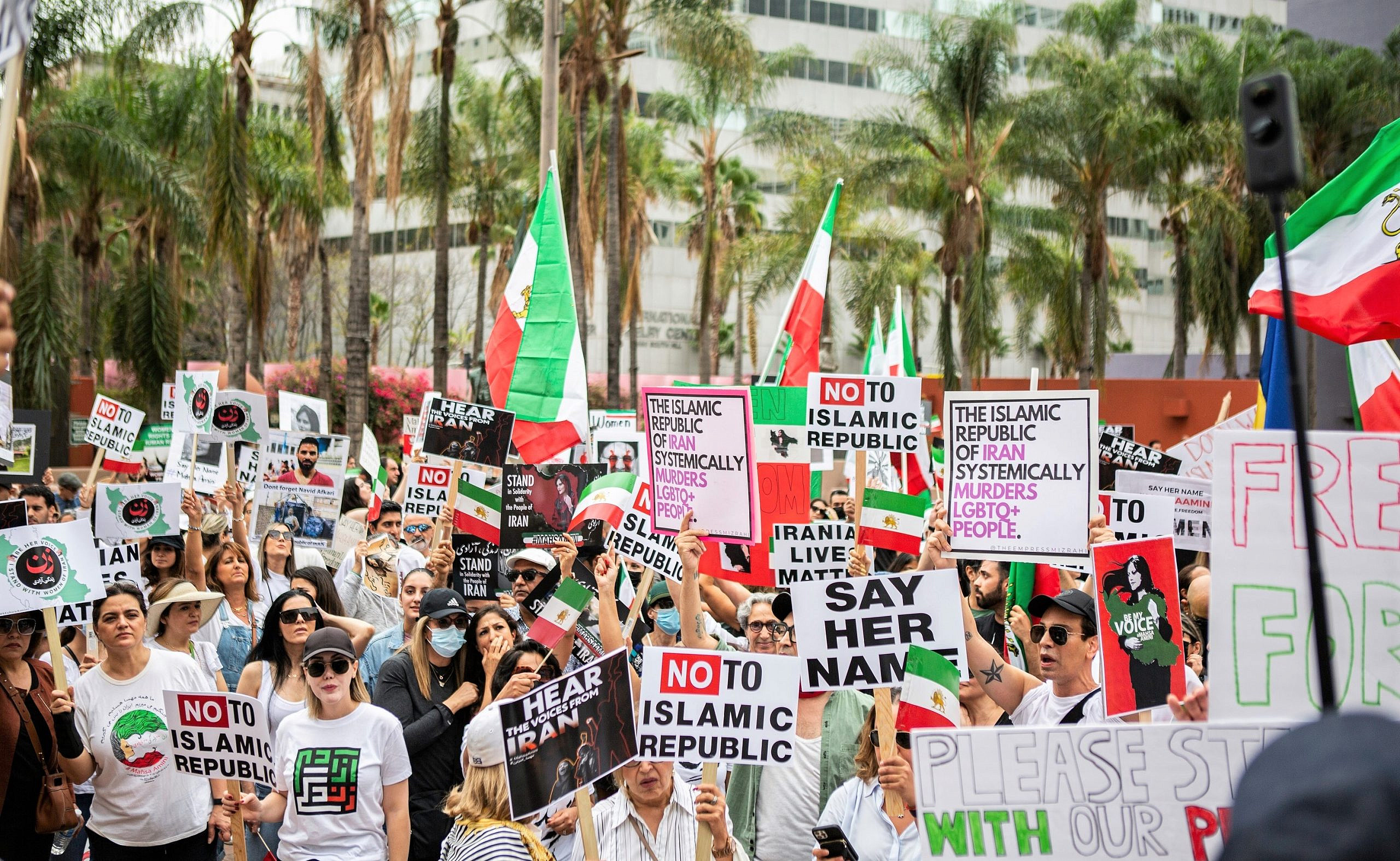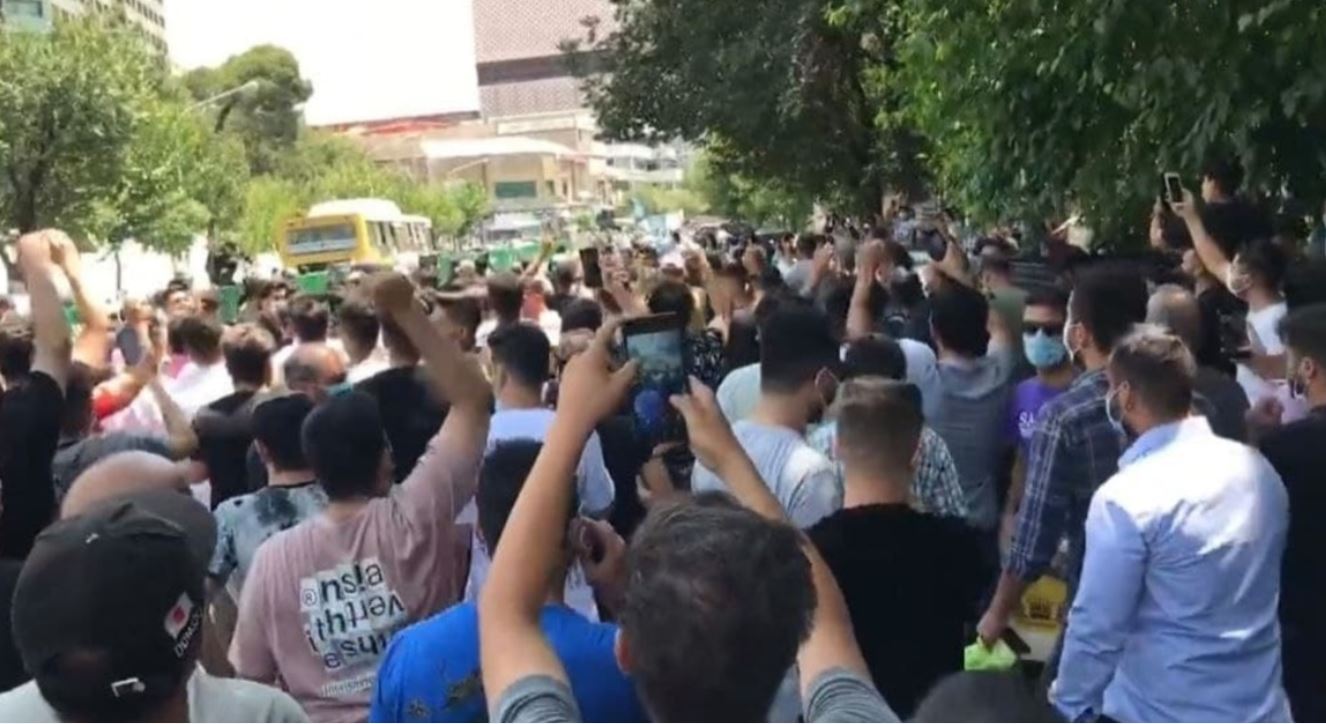They do so over the regime’s objections and under the threat of imprisonment or death.
By Karmel Melamed, JNS
Some 30 years ago, Homayoun and his classmates at his Tehran school stood daily before class and, following directions from teachers, chanted loudly, “Death to America!” and “Death to Israel!”
At the time, Homayoun—an alias to protect his identity—couldn’t locate either county on a map, and he didn’t understand why he was told to hate them.
Today, Homayoun—one of several sources living in Iran who spoke in Persian with JNS on the condition of anonymity because Iran bans citizens from contacting foreign news outlets—still lives and works in Tehran.
Not only does he not hate Israel, but he is in near daily contact on social media with many Israelis he calls friends.
In recent years, he and many other young Iranians are engaging with Israelis via social media over their government’s strict prohibition on its usage.
“There was a long history of warm relations between both peoples before the Islamic Revolution” in 1979, Jason Brodsky, policy director of the nonprofit United Against Nuclear Iran, told JNS. “What we see now are both Israelis and Iranians reaching out to develop common understandings to bypass the Iranian system’s dangerously warped ideology.”
Iranian American activists told JNS the online dialogue between Iranians in Iran and Israelis began between 10 and 12 years ago, when social-media platforms first became popular in Iran.
Curiosity and desire for accurate information have driven many Iranians to connect with Israelis, the activists said.
“When social media came along, the propaganda the Islamic Republic in Iran had put out about Israel all came crumbing down for millions of Iranians, who could see for themselves how terrorists like Hamas attacked innocent Israelis for no reason,” Ahmed Batebi, an Iranian American activist and journalist in Washington, D.C., told JNS.
“Iranians could directly communicate with people in Israel and receive friendly feedback from them,” he added.
A younger generation is leading a revolution that defies Islamist and nationalist authority, Reza Parchizadeh, an Iranian American activist in Maryland and an editor at Al Arabiya, told JNS.
“These kids have been raised on Western music, computer games and movies. They connect to each other and the wider world through Facebook, Twitter and Instagram,” said Parchizadeh. “They don’t perceive the world through the morbid mindset of the mullahs and belligerent attitude of the Revolutionary Guards.”
She was referring to Iran’s Islamic Revolutionary Guard Corps, a brutal multi-service primary branch of the Iran Armed Forces.

‘We will take the Israeli friendship’
Iran experts said widespread protests in Iran in recent years—and the full-blown revolution that erupted there six months ago—has increased social-media conversation between young people in Iran and Israelis, as the latter has been voicing strong support of freedom for Iranians.
The current uprising in Iran began last September after the regime’s morality police arrested Mahsa Amini in Tehran for not properly wearing the required Islamic head covering.
The officers reportedly beat the 22-year-old to death while in custody, and photographs of her body circulated on social media, enraging Iranians with the brutality. The protests have grown across the country, and security forces have reportedly responded violently.
Although people in Iran are cautious about discussing Israel publicly, many do so freely among close friends, anonymously or under false names on social media, according to Homayoun.
“Discussions about Israel are everywhere, especially on social media. People also talk in person whenever the issue arises among friends that they know,” he said. “We are careful because being in contact with anyone from Israel is still dangerous.”
The regime, which can easily claim someone it doesn’t like is working for the Mossad, creates problems for those who aren’t careful, he added.
Ali, a 20-something man living in Tehran, said Israelis’ overwhelming support for Iranians protesting for freedom has intensified Iranians’ desire to express their friendship with Israelis on social media.
“The people of Iran have well understood that they do not have better friends and allies than the people of Israel in the region, and they are trying to separate themselves from the regime,” he said. “Despite all the dangers, they still send out their messages of peace and friendship to the people of Israel.”
Iranians are finding ways around the filters the regime places online, blocking communication with Israelis and outside information, according to Hasan, another young Tehran resident.
“Average Iranians know the regime has its cyber police who may be monitoring their online activity, but it has gotten to the point where we don’t give a damn anymore because our lives are already miserable with the lack of food, lack of economic opportunities and lack of freedoms,” said Hasan.
“So we communicate with Israelis. Big deal! They’re the only ones in the world supporting us right now in our struggle against this brutal regime—not the Americans, not the French, not the Palestinians,” he added. “We will take the Israeli friendship and never forget it.”
Ali said the Iranian regime cites spying for Israel as a pretext to arrest and imprison political opponents, regardless of whether they communicated with Israelis or Westerners on social media.
Iran experts say there is evidence of growing admiration towards Israel in Iran. In recent years, videos uploaded to social media show Iranians avoiding stepping on Israeli flags placed on the ground outside universities and buildings.
Others show Iranians rejecting the regime’s anti-Israel policy by chanting at protests: “Not Lebanon, Not Gaza, I only sacrifice my life for Iran!”
When Hamas terrorists shot rockets into Israel over the course of two weeks in May 2021, many in Iran took to social media to send support to Israelis. An account identified as “Mamadou Archives,” which has since been deleted and appeared to be based in Iran, hosted a live gathering in May 2021. More than 25,000 participants—many of whom seemed to be Iranian—sent out nearly 100,000 tweets during the course of seven hours.
Israelis have extended warm messages to Iranians on Twitter and Instagram. Hananya Naftali, who has more than 188,000 followers on Twitter, is one such person. The pro-Israel activist told JNS he has posted messages in English and Persian and directed short videos at Iranians since 2019.
Social-media platforms right now are the only safe option for us to have a real dialogue with them about how we can help one another in the future when this radical Islamic regime is gone,” said Naftali.
He has received overwhelmingly positive responses from Iranians in Iran on social media. He has also received death threats and threats of violence from Islamic regime loyalists, he told JNS.
“They obviously see the tremendous, positive feedback I receive from people inside Iran, and they’re frightened of it,” he said.

‘The fight for freedom in Iran is important’
Emily Schrader is another prominent Israeli activist who regularly interacts with Iranians on social media in English and Persian. She told JNS that she began communicating with Iranians after they thanked her for her news reporting on the murder of Amini.
“It’s heartwarming to see that there are millions of people who understand the very real threat of Iran-backed terrorist organizations like Hamas and Hezbollah, which threaten us in Israel on a daily basis,” said Schrader. “It’s something that’s difficult to explain to the West, but sadly, the people of Iran understand exactly what’s happening because the Islamic regime is responsible.”
Schrader told JNS she has received thousands of threats and violent, misogynistic messages from “pro-regime thugs, many of which were from accounts that appear to be fake.”
“It is very obvious that the regime is watching my content and is concerned about the alliance growing between the people of Iran and the people of Israel,” she said. “They should be because we both stand on the side of justice and truth, and the Islamic regime stands for the greatest evil in the world today.”
The threats won’t dissuade her, insisted Schrader.
“The fight for freedom in Iran is important because Iran is responsible for the majority of the world’s problems in the region today,” she said. “The real motivation for me is that I as a woman cannot remain silent in the face of such a vile, gender apartheid regime that systematically oppresses women.”
Ben Sabti, who researches Iranian social networks at the Jerusalem Institute for Strategy and Security, and was a founder of the Israel Defense Forces Persian spokesperson’s office, told JNS he is surprised by the courage of the young Iranians with whom he frequently interacts on social media.
“I was very surprised that they are brave and really want to have direct contact with Israel,” he said. “This did not exist when I was a teenager in Iran, and everyone was afraid of the regime and afraid to have contact with the West and Israel.”
Iranian American activists told JNS they are confident that there will be strong business and social ties between Iranians and Israelis after the current Islamic regime loses power.
“We Iranians have an ancient friendship with the Jewish people,” said Batebi, “and I have no doubt that the day this current regime in Iran is gone, you will see an unbelievable alliance between Iran and Israel formed because both nations’ people have formed their new friendships.”
Do You Love Israel? Make a Donation - Show Your Support!
Donate to vital charities that help protect Israeli citizens and inspire millions around the world to support Israel too!
Now more than ever, Israel needs your help to fight and win the war -- including on the battlefield of public opinion.
Antisemitism, anti-Israel bias and boycotts are out of control. Israel's enemies are inciting terror and violence against innocent Israelis and Jews around the world. Help us fight back!























